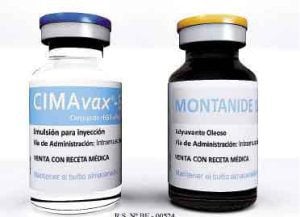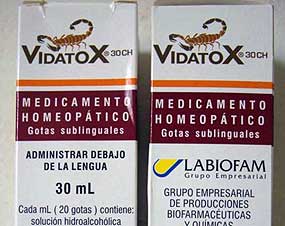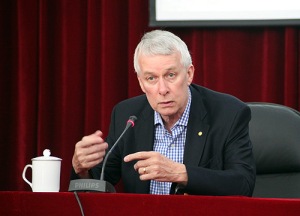Cuba Develops Four Cancer Vaccines, Ignored by the Media

The fact that Cuba has already developed four cancer vaccines undoubtedly is big news for humanity if you bear in mind that according to the World Health Organization nearly 8 million people die from that disease every year. However, the monopoly media have completely ignored this reality.
In 2012, Cuba patented the first therapeutic vaccine in the world against advanced lung cancer, called CIMAVAX-EGF. In January 2013, the island announced the second cancer vaccine, known as Racotumomab.
Clinical tests, carried out in 86 nations, revealed that though these vaccines do not cure the disease, they do reduce the tumors thus improving the quality and expectancy of life of the patients.
Vaccines developed by Cuba’s Molecular Immunology Centre
 The Havana-based Molecular Immunology Center is the creator of these vaccines. The center had already developed the Meningitis-B Vaccine in 1985, one of its kind in the world. Later there came other vaccines, such as the Hepatitis-B and the Dengue. Experts at the entity have been researching for years on a HIV-Aids vaccine as well.
The Havana-based Molecular Immunology Center is the creator of these vaccines. The center had already developed the Meningitis-B Vaccine in 1985, one of its kind in the world. Later there came other vaccines, such as the Hepatitis-B and the Dengue. Experts at the entity have been researching for years on a HIV-Aids vaccine as well.
The Cuban agenda against cancer is also joined by Labiofam pharmaceutical enterprise, which develops homeopathic medications against the disease, such as VIDATOX, made from the venom of blue scorpion, native of Cuba.
At present, Cuba exports these products to 26 countries and participates in joint ventures in China, Canada and Spain. This breaks the extended media silence about the advancements of Cuba and other South countries in the field, and the largely voiced stereotype that advanced pharmaceutics is only developed in the developed countries.
Cuba’s research philosophy opposes the market policies of the big pharmaceutical industry
And although Cuba obtains economic revenues from the sales of its products, its research philosophy diametrically opposes the market policies of the big pharmaceutical industry.
 Nobel Medicine Laureate Richard J. Roberts recently denounced that big pharmaceutical companies aim their research not to curing diseases, but to developing products for chronic conditions, which are more economically profitable. Roberts said that the diseases usually found in the poorest nations are not object of research, due to their low profitability, and for this reason 90 per cent of the research budget is dedicated to finding out about the diseases that affect only 10 per cent of the world population.
Nobel Medicine Laureate Richard J. Roberts recently denounced that big pharmaceutical companies aim their research not to curing diseases, but to developing products for chronic conditions, which are more economically profitable. Roberts said that the diseases usually found in the poorest nations are not object of research, due to their low profitability, and for this reason 90 per cent of the research budget is dedicated to finding out about the diseases that affect only 10 per cent of the world population.
Cuban research aims at developing vaccines to prevent diseases
The Cuban medical and pharmaceutical industry largely aims its research at developing vaccines to prevent diseases and, as a result, lower the people’s medication expenses.
Cuba attains higher health indicators than the United States using up to twenty times less resources, according to an article in Science Magazine by Paul Drain and Michele Barry, two scientists at the Standford University in California. It happens that there are no commercial or market pressures or profits on the Cuban model, while there is a successful educative strategy for the population as to prevention.
Along with these vaccines, natural and traditional medicine and other alternative medicinal practices have been introduced for years in the island’s health sector.
Generics put at the service of the poor countries and the WHO
In Cuba, medicines are distributed to the people firstly, through the hospital network free of charge and through a system of drugstores that sell them at highly subsidized prices.
The Cuban pharmaceutical industry hardly uses money for publicity, which in the case of multi-national corporations this activity surpasses the budgets dedicated to doing research.
The Caribbean nation is also boosting the production of generics that it puts at the service of other poor countries and the World Health Organization, at a price which is much lower than those imposed by the big world industry.
The US economic blockade hurts the US diabetic population
Last but not least, it is important to note that the US economic blockade of Cuba hinders the marketing of Cuban pharmaceuticals in the United States, thus affecting the US people. For instance, a total of 80 thousand diabetic people who undergo toe amputation every year in the United States every year cannot access the Cuban vaccine known as Heberprot-P, which precisely avoids such amputations.
Chemistry Nobel Prize winner Peter Agre recently said that Cuba is a magnificent example of how knowledge and scientific research can be integrated. The general director of UNESCO, Irina Bokova, said that she was impressed at the scientific achievements of Cuba and expressed her organization’s willingness to promote them around the world.
So then, the question to be asked here is: Will UNESCO be able to count on the crucial collaboration by the mainstream media to promote the Cuban achievements?

